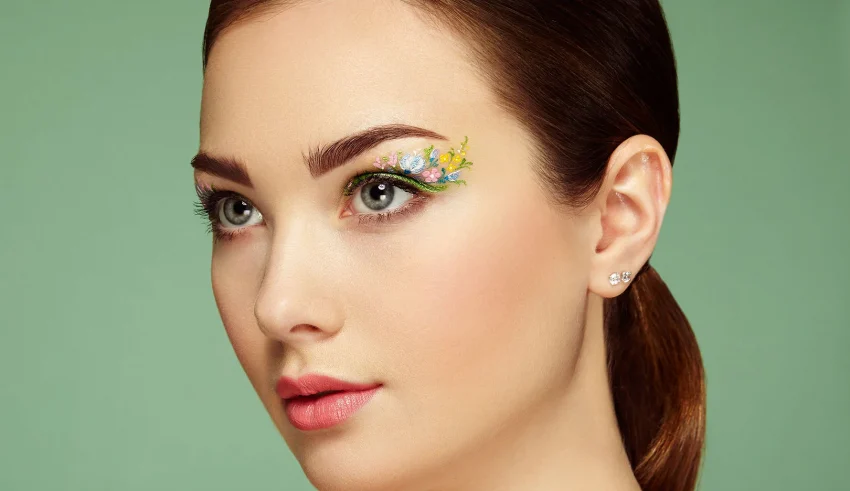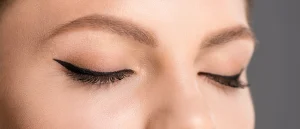
You may know that eczema is a condition that can cause dry, itchy skin, rashes, and other symptoms, but you probably wouldn’t think that it could bloom on your eyelids. When it affects your eyelids, it puts you at risk for other more serious skin conditions. Learn how to treat eczema on your eyelids and protect yourself from future skin damage in this article from The Dermo Lab in collaboration with the dermatologist Dr. Heba Abdallah.
What does eyelid eczema look like?
Eczema can affect the face and any area of the skin, including the eyelids. Unfortunately, no part of your skin is immune to eczema. Eyelid eczema symptoms can occur in one or both eyes. Your symptoms may be chronic or they may occur only occasionally. They can also involve the eyelids alone or the surrounding area.
According to Dr. Heba Abdallah, eyelid eczema manifests as an erythematous, scaly rash of the upper and/or lower eyelids and possibly the periorbital area. Patients often report symptoms of itching, burning, and stinging, and swelling may be present.
What causes eczema on the eyelids?
The skin on your eyelids is very thin. It contains many blood vessels and little fat. This makes them sensitive to irritation and prone to allergic reactions.
Eyelid dermatitis has many causes and can be caused by contact with allergens or irritants.
1- For people with allergic contact dermatitis, symptoms may be the result of an allergic reaction that causes inflammation of the skin. Symptoms occur when your immune system produces antibodies in response to a substance to which you are allergic. You may be allergic to pollen, latex, contact lens solutions, perfumes, etc. Dr. Heba Abdallah states that food allergies, such as milk, egg, peanut, and wheat allergies, have been identified as triggers for eczema in some people. Similarly, added sugars, refined carbohydrates, and gluten can trigger eczema.
2- Irritant contact dermatitis occurs when the area around your eyelids comes into contact with an irritating substance. You do not have to be allergic to the substance. For example, eye makeup or eye cream can cause irritant contact dermatitis even if you are not allergic to any of its ingredients.
Many substances that cause allergic contact dermatitis also cause irritant contact dermatitis. The difference between these two conditions is determined by your immune system’s response. Whichever type of eyelid dermatitis you have, it can result in itching and discomfort. Both types can be treated with medication or lifestyle changes.
Dr. Heba Abdallah notes that emotional stress and anxiety do not cause eczema, but they can provoke its symptoms. The body releases cortisol, which deregulates the immune system and causes an inflammatory reaction in the skin.
How to treat eczema on the eyelids?
Dr. Heba Abdallah emphasizes that taking care of your skin condition is the best way to improve your symptoms and get some relief.
If a trigger for your symptoms can be identified, eliminating it will be your first and best line of defense. If a trigger food is found, it will be important to eliminate it from your diet.
According to Dr. Heba Abdallah, remedies for eczema on the eyelids include moisturizers, steroids, and calcineurin inhibitors.
1- Moisturize. Moisturizing creams can relieve dryness and itching. A wide range of creams is available with and without a prescription. They are most effective in treating mild dermatitis.
2- Use calcineurin inhibitors. This medication is used to treat inflammatory disorders, including atopic dermatitis. It can be applied as a cream or taken by mouth. It should be used with caution because it can suppress immune function.
3- Use corticosteroids. Steroid creams can be applied directly to the eyelids to address inflammation and reduce dryness. For extensive cases of dermatitis or eczema, corticosteroids can be taken in pill form. The strength of the medication depends on the severity of the symptoms.
Corticosteroid creams should be used with caution because they can lose some of their effectiveness if applied for too long. When used near the eye, there is a risk of glaucoma if used for long periods. These creams can also cause some short-term side effects, such as acne, hair growth on the treated areas, and thinning of the skin.
How to prevent eyelid eczema?
The following steps can help prevent eyelid eczema flare-ups:
-
- Avoid scratching or rubbing the eyelids. This can cause further damage to the skin and increase the risk of infection.
- Change your diet. As we’ve seen, food allergies can trigger eyelid dermatitis.
- Avoid certain moisturizers. Products containing formaldehyde, lanolin, parabens, or perfume may cause additional skin irritation.
- Wear protective clothing. Protecting the eyes from potential irritants, using goggles, can help.
- Moisturize regularly. Daily use of a moisturizer on the eyelids can prevent symptoms from developing.
- Use less soap. By taking shorter showers or baths, you reduce the amount of time your skin is exposed to potential irritants. Using milder soaps, antibacterial soaps or fragrance-free soaps can also be helpful.
- Use lukewarm water instead of hot water.
- Limit the use of makeup. Using makeup around the eyes, such as eyeshadow or mascara, can irritate the sensitive eye area. Even hypoallergenic cosmetics should be avoided until your symptoms improve.
Dr. Heba Abdallah affirms that eczema is a chronic condition. Over time, your eczema flare-ups may fade and disappear, and then intensify when your skin is exposed to an irritant.
What are some complications that may occur with eczema on eyelids?
According to Dr. Heba Abdallah, complications that can occur with eyelid eczema are the following:
- Skin infections. Scratching or rubbing the eyes can make the skin vulnerable to infection.
- Eye infections. Bacteria can enter the eye by repeatedly touching or rubbing the area, causing infections.
- Difficulty sleeping. Symptoms of eyelid dermatitis can cause discomfort while sleeping.
- Neurodermatitis. Chronic scratching or rubbing can increase the urge to scratch.
Summary
Eyelid dermatitis does not pose a serious health risk, although it can be uncomfortable and interfere with daily life.
Both allergic and irritant contact dermatitis can be successfully treated and eliminated. Determining the cause of your symptoms can help reduce the risk of recurrence. There are many irritants and allergens in the environment, so it is not always possible to determine the cause of your symptoms.
When triggers cannot be identified or avoided, treatments will be used to manage the symptoms as best as possible. The effectiveness of eyelid eczema treatment may depend on the extent of exposure to triggers and the sensitivity of the skin.
Using strategies to prevent symptoms, such as avoiding itching or rubbing the eyes, will help improve and reduce the severity or onset of symptoms. A doctor or skin specialist can recommend the most appropriate measures for each individual.
Finally, it’s important to talk to your doctor if your eyelids are irritated. The sooner you see your doctor, the sooner you can begin treatment and find relief.









